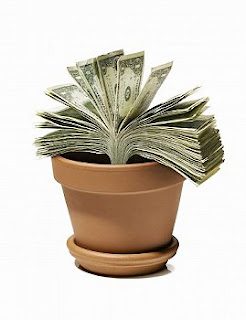Like my blog? Sign-Up for a FREE newsletter! OR Give a ‘Like’ to my FaceBook Page
Editor’s Note: This guest post is by Mariana Ashley
 I once knew a young man who was busy saving money for his wedding, hoping that once he hit a certain dollar amount he would ask his longtime girlfriend to marry him. Midway into his saving endeavor, the transmission blew on his truck and suddenly he had to pay $2,000 to get it fixed. The young man didn’t have a rainy day fund in place to cover unexpected expenses and sadly had to use some of the money he had been saving for a fancy wedding on something as routine as a transmission.
I once knew a young man who was busy saving money for his wedding, hoping that once he hit a certain dollar amount he would ask his longtime girlfriend to marry him. Midway into his saving endeavor, the transmission blew on his truck and suddenly he had to pay $2,000 to get it fixed. The young man didn’t have a rainy day fund in place to cover unexpected expenses and sadly had to use some of the money he had been saving for a fancy wedding on something as routine as a transmission.
While it was good that he didn’t have to put this sudden expense on a credit card or ask his parents for money, the young man’s situation reminded me of why it’s important to have a rainy day fund. A rainy day fund is an emergency savings account that helps cushion the blow if something unexpected happens, like losing your job or having your car break down.
There are hundreds of little things that could crop up that are outside of a carefully planned budget. You could break a bone or get appendicitis and suddenly have a mountain of hospital bills. Your dog could get in a fight with another dog and need expensive veterinary care. Your refrigerator could stop working and suddenly you have to buy a new one. Or an uninsured family member could pass away, and you are called upon to help with funeral expenses.So how much money should you put into a rainy day fund? A good place to begin is to save three months’ worth of living expenses. If you already have a firm budget in place, then it should be fairly easy to calculate how much you spend on bills and necessities like food in an average month. If you don’t have a budget in place, you will need to sit down and determine how much you spend each month on bills like rent/mortgage payments, car payment, insurance, electricity, cell phones, etc. Then look back at your bank ledger and add up how much you spend on groceries. Add all of your routine expenses to determine how much money goes out from your account each month. Multiply this by three and you have determined an estimated three months’ worth of living expenses.The reason it is recommended to save three months’ worth of living expenses is that three months is about how long it would take to find a new job if you were to suddenly become unemployed, especially in a sour economy where companies are doing less hiring. Some people even choose to save up six months’ worth of living expenses just in case a job hunt would take them even longer.Once you’ve hit your goal on your rainy day fund, you can stop adding money to the account and focus your finances on other goals, like paying off any debt, saving for retirement, or investing. Finally, any time you have to use your rainy day fund for an emergency, be sure to replenish your savings as soon as you can.
About the Author: Mariana Ashley is a freelance writer who particularly enjoys writing about online colleges. She loves receiving reader feedback, which can be directed to mariana.ashley031@gmail.com.
 About Guest Writer
About Guest Writer
This post was written by a guest writer. If you’d like to add a guest post in Money Hacker, please check out Write for Us page for details about how YOU can share your knowledge with our community.
